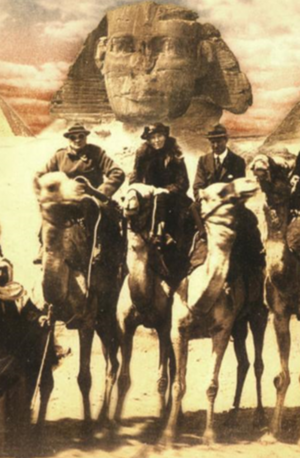1921 Cairo Conference
The boundaries of modern Iraq, subject to British geopolitical interests, were set at the Cairo Conference convened on 12 March 1921. Winston Churchill led the meeting, with a portfolio including air and the colonies. The political commissioner, Percy Cox, was a key figure, as well as Gertrude Bell and T.E. Lawrence. It installed a king from the Hashemite dynasty.
A picture taken on 22 March, the last day of the Conference, shows some of the key participants.
...and the final opportunity for the British to determine the postwar future of the Middle East. Like any tourist, the delegation makes the routine tour of the pyramids and have themselves photographed on camels in front of the Sphinx. Standing beneath its half-effaced head, two of the most famous Englishmen of the twentieth century confront the camel in some disarray: Colonial Secretary Winston Churchill, who has just, to the amusement of all, fallen off his camel, and T. E. Lawrence, tightly constrained in the pin-striped suit and trilby of a senior civil servant. Between then, at her ease, rides Gertrude Bell, the sole delegate possessing knowledge indispensable to the Conference. Her face, in so far as it can be seen beneath the brim of her rose-decorated straw hat, is transfigured with happiness. Her dream of an independent Arab nation is about to come true, he choice of a king endorsed: her Iraq is about to become a country. Just before leaving the hotel that morning, Churchill has cabled to London the vital message "Sharif's son Faisal offers hope of best and cheapest solution.[1]
Bell and Cox were given the job of drawing the boundaries of Iraq to suit British interests. [2]
Those interests balanced needs for oil, promises to Arab and Zionist allies against the Ottomans, power balance with France and Russia, and other complex situations.
References
- ↑ Georgina Howell (2006), Gertrude Bell: Queen of the Desert, Shaper of Nations, Farrar, Straus and Giroux, ISBN 978037416120, p. 3
- ↑ William O. Beeman (May 2004), Strategic Insights, Naval Postgraduate School III (5)
